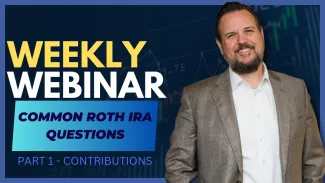
Common Roth IRA Questions | Part 1 – Contributions
Mark returns with a fresh Weekly Webinar that includes market updates, a summary of recent economic news, and a focused financial planning segment designed to enhance your retirement preparedness. This week kicks off a new 3-part series where Mark delves into common Roth IRA questions, today, he begins with an exploration into Roth contributions.
Beginning with Slott Updates, Mark discusses updates related to Slott and the changes to the Required Minimum Distribution (RMD) rules. He addresses a lesser-known change introduced by Secure 2.0, which impacts RMD calculations for retirement accounts. Mark outlines various factors that affect RMD calculations, such as age, account type, and whether the account is inherited. He also addresses the uncertainty surrounding the application of these rules and suggests seeking IRS guidance. A couple of specific cases are discussed to illustrate the complexities of RMD calculations and the importance of seeking expert advice for accurate and compliant handling of retirement accounts.
Mark then moves on to a brief overview of recent market trends, economic indicators, and insights from experts regarding short-term investments and interest rate dynamics. He begins by discussing recent market developments, noting that there have been some interesting developments, including reports on retail sales and auto sales. Mark talks about how the lead economic indicator declined by 0.4% in July, which is better than expected. He also discusses the rise in interest rates, particularly the 10-year Treasury rate, which hit the highest level since 2008. Higher yields can impact growth stocks and the housing market, with mortgage rates reaching their highest levels in two decades. Mark then provides an overview of recent market performance. Money markets and short-term treasuries are discussed as having higher returns due to the inverted yield curve. However, Mark cautions that short-term investments carry reinvestment risks and purchasing power risks, especially considering the potential for changing interest rates and inflation.
Common Roth IRA Questions, Part 1: Roth Contributions
For the Financial Fifteen section of this week’s webinar, Mark discusses Roth IRA contributions as the first installment of a three-part series on Roth IRAs. The discussion touches on the following:
- Benefit of a Roth IRA: The main benefit of a Roth IRA is that qualified distributions are tax-free. This means that when money is withdrawn from the Roth IRA, neither the original contributions nor the earnings are subject to taxation. Mark mentions that this benefit is subject to following the five-year rule and other distribution requirements.
- Contributions: Mark explains the rules for making contributions to a Roth IRA. To contribute, individuals must have earned income. Examples of earned income include wages, salaries, and self-employment income. Income sources like Social Security, pension, and rental income do not count as earned income. The maximum contribution limit for a Roth IRA in 2023 is $6,500 for those under 50 and $7,500 for those over 50 (including a catch-up contribution). Spousal contributions are also allowed, allowing a working spouse to contribute on behalf of a non-working spouse.
- Phase-Out Limits: Mark mentions that there are income phase-out limits for Roth IRA contributions. If your modified adjusted gross income (MAGI) exceeds certain thresholds, your contribution limit decreases or phases out. Beyond specific income levels, contributions are no longer allowed. For 2023, the phase-out begins at $138,000 for single filers/head of household and $208,000 for married couples filing jointly.
- Backdoor Roth Contributions: Mark briefly mentions the possibility of using a backdoor Roth contribution method for those who exceed the income limits for direct contributions. This involves making a non-deductible traditional IRA contribution and then converting it to a Roth IRA. However, complexities related to pro-rata rules should be considered.
Contribution Deadline: Contributions to a Roth IRA can be made up until the tax filing deadline for the year. For example, contributions for the tax year 2023 can be made up until the tax filing deadline in April 2024. - Investment Options: Roth IRAs offer a wide range of investment options similar to traditional IRAs. Individuals can invest in stocks, bonds, mutual funds, ETFs, and other assets, depending on the specific account provider.
- Returns: Mark emphasizes that the type of return you can expect from investments in a Roth IRA is the same as what you’d expect from investments in a traditional IRA. The difference lies in the tax treatment, with Roth IRA distributions being tax-free upon meeting distribution requirements.
- Taxation of Contributions: Contributions made to a Roth IRA are not tax-deductible. Therefore, the contributions themselves do not reduce your taxable income for the current tax year.
- Withdrawals: Generally, individuals can withdraw from a Roth IRA penalty-free after reaching the age of 59 and a half. The speaker briefly mentions the five-year rule, which will be discussed further in the distribution section.
- Am I Too Old or Too Young: Mark states that as long as an individual is still working and meets the requirements for contributing to a Roth IRA, age is not a limiting factor. He encourages people not to limit themselves based on age alone.
- Benefits of a Roth IRA: Mark explains that contributing to a Roth IRA offers the advantage of locking in your tax rate for your lifetime plus 10 years. This means that the contributions and earnings in a Roth IRA grow tax-free, and qualified distributions are tax-free as well. He highlights that this tax advantage continues even for inherited Roth IRAs, where beneficiaries typically have at least 10 years to withdraw funds without the requirement of minimum distributions.
- Why Stop Contributing: Mark addresses a question pertaining to why someone would stop contributing to a Roth IRA simply because they reach a certain age, such as 59 and a half, 65, or 70. He stresses that if someone is still working, meets the income and other requirements for contributing to a Roth IRA, and the tax rate aligns with their financial strategy, there is no reason to stop contributing.
- No Regrets: Mark mentions that he has never encountered someone who regretted starting a Roth IRA earlier. People often express a wish that they had known about the benefits earlier so they could have started sooner. He encourages viewers to empower their loved ones with this information, whether it’s family, friends, or clients, as it can have a significant positive impact on their financial future.
- Youth and Roth IRAs: Mark points out that even young individuals, like a 17-year-old or a 21-year-old, can benefit from having a Roth IRA. He shares that his own children have Roth IRAs and Roth 401(k)s, highlighting that it’s never too early to start planning for retirement and taking advantage of the tax benefits.
If you’ve been considering opening a Roth IRA, or have questions of your own pertaining to this kind of account – it’s an episode you don’t want to miss!
Visit our website: https://attleborowealt.wpengine.com
Schedule a meeting with Mark at: https://attleborowealt.wpengine.com/discovery
Each Wednesday at 10:00 a.m. (unless it follows a Market Holiday), I hold a Live Webinar where I discuss recent headlines, IRA and retirement issues from the Ed Slott Group, market updates and analyst reports, and a timely Financial Planning strategy or technique.
The opinions expressed in this program are for general informational purposes only and are not intended to provide specific advice or recommendations for any individual or on any specific security. It is only intended to provide education about the financial industry. To determine which investments may be appropriate for you, consult your financial advisor prior to investing. Any past performance discussed during this program is no guarantee of future results. Any indices referenced for comparison are unmanaged and cannot be invested into directly. As always please remember investing involves risk and possible loss of principal capital; please seek advice from a licensed professional.
Attleboro Wealth Management, LLC is a Registered Investment Adviser. This program is solely for informational purposes. Advisory services are only offered to clients or prospective clients where Attleboro Wealth Management, LLC and its representatives are properly licensed or exempt from licensure. Past performance is no guarantee of future returns. Investing involves risk and possible loss of principal capital. No advice may be rendered by Attleboro Wealth Management, LLC unless a client service agreement is in place.

